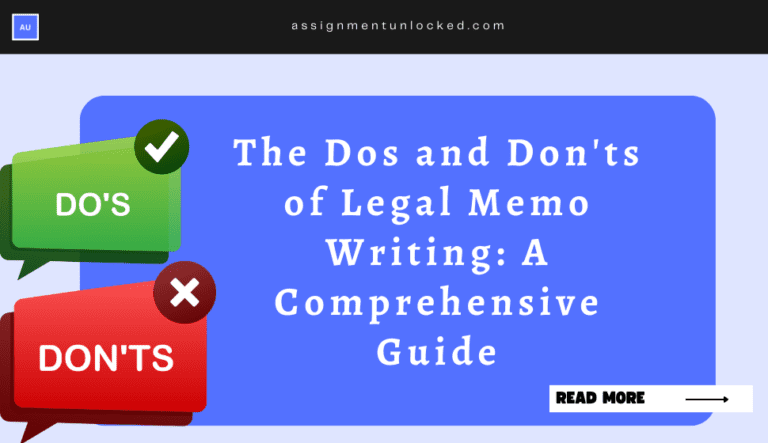If you are a law student or a legal practitioner, you are most likely familiar with the importance of writing legal memos. Legal memos are documents that provide a brief analysis of a legal issue or problem and propose a recommendation or solution. It is essential to write legal memos that are clear, concise, and informative. In this comprehensive guide, we will outline the dos and don’ts of Law memo writing with the help of assignment help to help you improve your skills and write effective legal memos.
Law memo writing is an essential skill that law students and legal practitioners must master. It requires a thorough understanding of the legal issue, the ability to analyze and interpret the law, and the skills to communicate your findings clearly and concisely.
Understanding Legal Memo Writing
A legal memo is a document that summarizes a legal issue and provides legal analysis, recommendations, and conclusions. It is a tool used by attorneys to communicate legal advice to clients, colleagues, and judges. Law memo writing is a crucial component of law school curriculums and legal practice. The goal of legal memo writing is to communicate legal advice in a clear, concise, and organized manner.
The Purpose of Legal Memo Writing
The purpose of a legal memo is to provide legal advice on a specific legal issue. The memo should identify the legal question presented, provide an analysis of the relevant law, and apply the law to the facts. The memo should also include a recommendation and conclusion based on the analysis. The memo should be written in a clear, concise, and organized manner.
The Audience of Legal Memo Writing
The audience of a legal memo can vary depending on the context. It can be written for a client, a colleague, or a judge. The memo should be written in a way that the audience can understand the legal issue and the legal advice being provided. It should be written in a clear, concise, and organized manner.
By considering your audience’s background and expectations, you can effectively communicate legal issues and recommendations clearly and concisely.
Dos of Legal Memo Writing
1-Clearly state the issue
The first and most important step in writing a legal memo is to clearly state the issue. This means identifying the legal question that needs to be answered. You should be concise and precise in your statement of the issue. Make sure to use the appropriate legal terminology and avoid using colloquial language.
2-Provide a summary of the law
Once you have identified the legal issue, you need to provide a summary of the law. This means outlining the relevant statutes, case law, and legal principles that apply to the issue. You should cite your sources and provide a brief analysis of each one.
3-Analyze the law and its application
The next step is to analyze the law and its application to the issue at hand. This means explaining how the law applies to the facts of the case. You should be clear and concise in your analysis, and use plain language that your reader can understand.
4-Use proper legal terminology
Law memo writing requires the use of proper legal terminology. You should be familiar with the relevant legal terms and use them correctly in your memo. Avoid using colloquial language or slang.
5-Use headings and subheadings
Headings and subheadings can help you organize your memo and make it easier to read. Use descriptive headings that summarize the content of each section. This will help your reader navigate the memo and understand its structure.
6-Provide a conclusion
Finally, you should provide a conclusion that summarizes your analysis and provides a clear recommendation. Your conclusion should be concise and precise and should answer the legal question that you identified at the beginning of your memo.
By following these dos, you can create a professional and effective legal memo that effectively communicates legal issues and recommendations.
Don’ts of Legal Memo Writing
1-Don’t Use Personal Pronouns
Legal memos should be written in the third person. Avoid using personal pronouns such as “I” or “we.” Instead, use more formal language such as “the author” or “the writer.”
2-Don’t Make Assumptions
Legal memos should be based on facts and evidence, not assumptions. Don’t make assumptions about the law or the facts of the case. Instead, do your research and provide evidence to support your argument.
3-Don’t Use Emotive Language
Legal memos should be objective and professional. Avoid using emotive language that may influence the reader’s opinion. Stick to the facts and present a logical argument.
4-Don’t Ignore Formatting and Layout
Legal memos should be well-formatted and have a clear layout. Use appropriate font and spacing to make the memo easy to read. Use headings and subheadings to organize your argument.
5-Don’t Forget to Proofread
Proofread your legal memo carefully to avoid errors and typos. Errors in your memo may undermine your argument and make it difficult for the reader to take you seriously.
By avoiding these don’ts, you can create a clear, concise, and effective legal memo that meets the needs of your audience.
Also Read: 5 Mistakes to Avoid When Seeking Dissertation Assignment Help Services
Conclusion
In conclusion, writing a Law memo writing can be a challenging task, but it is a crucial skill and can be easy by considering law assignment help for any law student or practitioner. By following the dos and don’ts outlined in this comprehensive guide, you can create a memo that effectively communicates legal issues and recommendations to your audience. Remember to understand your audience, use proper formatting, and maintain a clear and concise writing style.
With practice, you can master the art of legal memo writing with law homework help from Assignment Unlocked. Students may sometimes face tight deadlines for submitting assignments. Assignment unlocked can help them find writers who are capable of delivering quality work within the given timeframe.
FAQs
- What is a legal memo?
A legal memo is a document that communicates legal issues and provides recommendations to clients, supervisors, or judges.
- Who should read my legal memo?
The audience for your legal memo will depend on its purpose. It could be your supervisor, a client, or a judge.
- What is the tone of a legal memo?
Legal memos should be written in a formal tone, but the language used will depend on the audience.
- Should I use legalese in my memo?
No, it is best to avoid using legalese in your memo, especially if it is intended for a non-legal audience.
- What are some common mistakes to avoid when writing a legal memo?
Some common mistakes to avoid when writing a legal memo include using vague language, failing to cite legal authority, and including irrelevant information.






